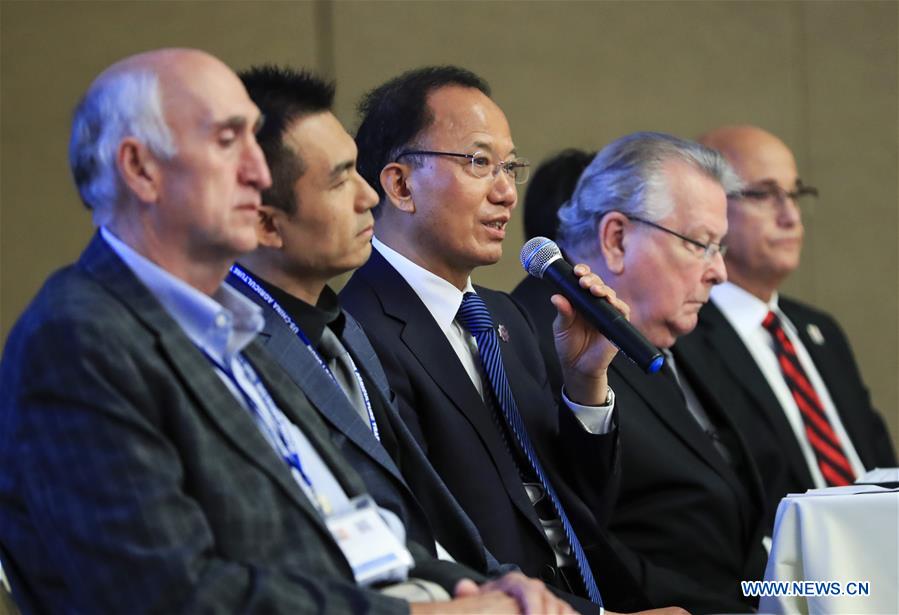
Zhao Zhenge (C), general representative at the U.S. office of the China Council for the Promotion of International Trade (CCPIT), speaks at the 2nd U.S.-China Agriculture Food Trade Forum in Los Angeles, California, the United States, Oct. 24, 2019. Agri-food industry leaders and government officials on Thursday highlighted a great potential for cooperation between the United States and China at a bilateral trade forum held in the U.S. state of California. (Xinhua/Li Ying)
LOS ANGELES, Oct. 24 (Xinhua) -- Agri-food industry leaders and government officials on Thursday highlighted a great potential for cooperation between the United States and China at a bilateral trade forum held in the U.S. state of California.
Meanwhile, they called for proper handling on both sides of the trade dispute at the 2nd U.S.-China Agriculture Food Trade Forum held in the City of Industry.
Cooperation in the agriculture and food sector has been solid despite the trade dispute, said Zhao Zhenge, general representative at the U.S. office of the China Council for the Promotion of International Trade (CCPIT), "Everyone of you present here made great efforts to keep the bilateral trade thriving over the past year."
China was the third largest importer of U.S. agricultural products from 2009 to 2017. Data by the American agricultural society show the U.S.-initiated tariff war against China and other factors have led U.S. agricultural exports to China to fall 20 percent in the first half of 2019, with soybean inventories hitting a record 49 million tonnes on June 1 and prices down 9 percent.
"With a large population and fast increasing income, the growing demand of Chinese (market) means huge business opportunities for American agriculture," said Zhao in his speech at the forum.
"The interests of the two sides are deeply intertwined, and levying tariffs or even economic 'decoupling' is not in line with it," he noted.
The agri-food forum came after the U.S.-China high-level economic and trade consultations held on Oct. 10-11 in Washington D.C. concluded with progress in areas including agriculture, intellectual property rights, currency exchange rates, financial services, expansion of trade and technology transfers.
"This forum takes place at just the right time," said Liu Haiyan, commercial counselor of Chinese Consulate General in Los Angeles.
By Oct. 17 and "based on the needs of the domestic market," Liu told the forum that Chinese enterprises have purchased from the United States a large amount of agricultural products.
He added that China will speed up buying U.S. agricultural products.
"These facts show that China and the United States have huge space for cooperation in the field of agricultural trade, and the prospects are very bright," he said.
China is the world's largest importer of agricultural products and consumption continues to grow. It is also the largest consumer of imported food with the import of fruits and aquatic products growing rapidly.
"It's definitely our farmers who have felt the brunt of the trade war and they're making sacrifices," said Andrew Jones, a state Senator of Alabama, while noting that a trade war has no winners.
"For this trade war, the best situation is to be resolved as quickly as possible and our farmers can get their goods to market," he added.
Ed Harlan, assistant commissioner of Tennessee state department of agriculture, said the agri-food trade forum provides an opportunity for both importers and exporters.
"We have tremendous poultry, soybean, and cotton production in Tennessee, and all of those are exported," he told Xinhua, noting that China is a huge market for Tennessee and other agricultural states.



